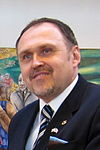Yukon general election, 2016
|
|
|||||||||||||||||||||||||||||||||||||||||||||||||||||
|---|---|---|---|---|---|---|---|---|---|---|---|---|---|---|---|---|---|---|---|---|---|---|---|---|---|---|---|---|---|---|---|---|---|---|---|---|---|---|---|---|---|---|---|---|---|---|---|---|---|---|---|---|---|
|
|||||||||||||||||||||||||||||||||||||||||||||||||||||
|
|
|||||||||||||||||||||||||||||||||||||||||||||||||||||
|
All to the Legislative Assembly 10 seats needed for a majority |
|||||||||||||||||||||||||||||||||||||||||||||||||||||
| Turnout | 79.9% | ||||||||||||||||||||||||||||||||||||||||||||||||||||
|
|||||||||||||||||||||||||||||||||||||||||||||||||||||

Popular vote by riding. As this is an FPTP election, seat totals are not determined by popular vote, but instead via results by each riding.
|
|||||||||||||||||||||||||||||||||||||||||||||||||||||
|
|||||||||||||||||||||||||||||||||||||||||||||||||||||
The 38th general election in Yukon, Canada, took place on November 7, 2016 to return members to the 34th Yukon Legislative Assembly.
The election was fought over issues relating to the economy, the environment, First Nations reconciliation, fracking, and the merits of a territorial carbon tax. The incumbent Yukon Party government, led by Darrell Pasloski, was defeated by the third party Liberal Party of Sandy Silver, ending 14 years of Yukon Party rule.
Premier Darrell Pasloski lost his own seat.
During the campaign, the issues of economic diversification, environmental management, and First Nations reconciliation were central themes, as was each party's stance on fracking. The announcement that the federal government would impose a national carbon tax also affected the political direction of the campaign, with the Yukon Party vowing to fight any effort to impose a carbon tax on the Yukon.
The incumbent Yukon Party, led by Darrell Pasloski since 2011, had governed the Yukon since 2002 when it defeated the Yukon Liberal Party. While the Yukon Party had been re-elected in 2011 during a commodity boom, by 2016 the Yukon economy was in a recession. Leading into the 2016 campaign, the Yukon Party was drawing criticism over its poor relationship with First Nations, its stance on the environment, access to healthcare, and a perceived mismanagement of the Yukon economy.
The Yukon Party ran on a campaign of True North. Central to this campaign was prioritizing the creation of jobs, growing the economy, and keeping taxes low. It also adamantly opposed the federal carbon tax.
The Yukon Party entered the 2016 campaign with ten of its twelve MLAs seeking re-election, albeit it with two running in different ridings (Scott Kent and Doug Graham).
The Yukon New Democratic Party, led by Liz Hanson, had been the Official Opposition since 2011. The party had been critical of the Yukon Party’s relationship with First Nations, its stewardship of the economy, and its management of government services such as healthcare.
...
Wikipedia



